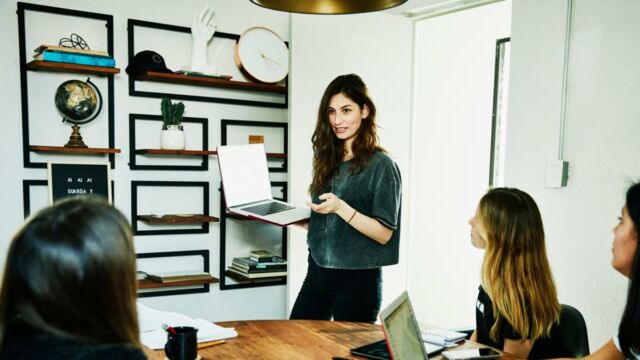9 Stereotypes That Still Exist Today About Women In Power

Some stereotypes never truly die and women in significant positions of power aren’t likely to disagree. Oh My Mag has put together a list of some of the most stubborn and long-standing stereotypes that still exist about women in power today. And they’re not exactly pleasant to read.
They are man-eaters
It’s a fact, powerful women are money-hungry women who take pleasure in attacking their male preys. False. Women aren’t sex fiends or slaves to their sexual desires.
Discover our latest podcast
‘You don’t become powerful unless you have desire. Behind every person in power, there is a notion of desire which people often confuse with sexuality,’ explained psychoanalyst Sophie Cadalen to the French magazine, Cheek.More under this adMore under this ad
‘When men play with their sexuality, they are consequently seen as conquerers,’ while women on the other hand are seen as ‘man-eaters’.
They are unpredictable
In the world of work, women are unpredictable creatures. It’s true, they can fall pregnant, decide to keep the baby and then forget to or put off signing some important documents… Well, rest assured, just like all men, women know how to distinguish between work and their family lives.
More under this adMore under this adThey bully their colleagues
Whether we’re looking at fictional characters like Miranda from ‘Devil Wears Prada’ or even more well-known real-life examples such as Margaret Thatcher, women in power aren’t always as strict, harsh and confrontational as the stereotypes suggest. They’re not as ruthless as you think and not all women in power have that classic ‘iron fist’ we associate them with.
They have an inferiority complex
In the halls, at the coffee machine or even by the water cooler, we always consider women who have managed to rise up through the ranks to be women with strong inferiority complexes. Wrong again. In order to work your way up to the top when you are a woman, all you need is a lot of personal ambition.
More under this adMore under this adThey are just part of a quota
Ah, equality. A word that is so often confused or misunderstood. Most of the time, it is used to demean the presence of women who have worked their way up to significant positions of power. Women in politics are often victims of this stereotype and prejudice. However, just like male politicians, they are actually selected via an election process. No quotas to fill here.
They are quite manly
It’s a well-known fact that women in power are more manly than most other women. Or at least, they become this way as a result of being in a man’s world. However, ‘power' doesn’t necessarily mean ‘virility’. Women can move mountains, but ‘the more they want something, the more they are looked down on. As if wanting something wasn’t acceptable and was something that was only reserved for men,’ explained Sophie Cadalen.
More under this adMore under this adThey do not fulfil their motherly duties
‘Women have to take care of their children!’ Sexism is still quite apparent in society and even now in the 21st century, we keep coming back to these same observations. It seems it is still up to women to make the big decisions when it comes to their children, while her husband or partner can happily swan off towards his destiny and goals with nothing holding him back.
They use sex as a weapon
‘Today, being attractive is quite complicated. Take Rachida Dati and NKM for example, who have long been accused of overdoing it. But the question is whether they are actually overdoing it if we compare them to others, such as Jack Lang, who always look impeccable and are always dressed to the nines?' the psychoanalyst asked her colleagues. Being attractive and successful is not necessarily connected like it is for the casting couch.
More under this adMore under this adIt’s all about appearances
For men, all they have to do is spray themselves with some deodorant and boom, they have a job! For women in power, they need to be more thoughtful and conscious of their wardrobe and beauty choices because dress codes are very different for the two genders. For example, they need to find a hairstyle which doesn’t look too strict, but is also the right level of professional, heels that are high enough but that they are still able to walk in and they also need to wear the right amount of makeup without looking vulgar or like a clown… In other words, there is an endless list of things to take into account for women which, if not respected, would be met with judgement and condescension.
According to a report carried out by the French institution known as the Superior Council for Professional Equality between men and women back in 2016, 80% of women who work in the world of economics regularly have to deal with sexist attitudes and comments at work.
More under this adMore under this adFor more information, check out the video above.